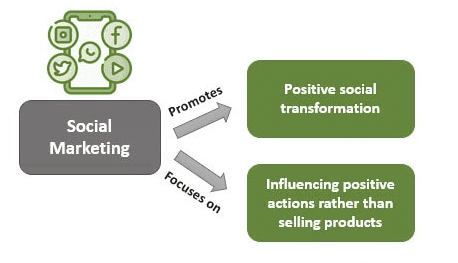Social Marketing | Crash Course for UGC NET Commerce PDF Download
Social Marketing Overview

In the fast-paced and interconnected world of today, social marketing has emerged as a powerful tool for businesses and organizations to engage with their target audience, build brand awareness, and drive meaningful interactions. Harnessing the influence of social media platforms, social marketing leverages strategic content creation, community engagement, and data analytics to create a dynamic online presence. It is not merely about promoting products or services but also about cultivating relationships, fostering brand loyalty, and staying attuned to the evolving preferences of the digital audience. As a multifaceted approach, social marketing integrates creativity with analytics, transforming social media channels into vibrant spaces for dialogue, innovation, and brand advocacy.
Social Marketing-Meaning
Social marketing is a strategy that aims to change people's behaviors, thoughts, and perceptions regarding a product or service. It delves into the emotions of individuals, seeking to influence and transform them. Various marketing channels are utilized to effectively reach the intended audience.
Social Marketing-Examples
- Anti Smoking Campaigns - These initiatives center on diminishing the prevalence of smoking by educating the public about the associated health hazards.
- Environmental Campaigns - These campaigns are designed to raise awareness about environmental issues and promote methods to mitigate them.
Key Social Media Marketing Strategies
- Influencer Marketing: Collaborate with influential social media personalities to endorse your products or services, leveraging their large following for wider outreach.
- Content Marketing: Create and distribute valuable content on social platforms like blog posts, videos, and infographics to engage your target audience.
- Social Advertising: Invest in paid promotions on social media to connect with your desired audience through sponsored posts, display ads, and other formats.
- Social Media Listening: Monitor social channels to grasp public sentiment about your brand, enabling you to address customer needs and feedback effectively.
- Social Media Engagement: Interact with followers and customers to foster relationships, by responding to comments, messages, and reviews, and sharing user-generated content.
- Community Management: Oversee online communities associated with your brand, involving moderation of discussions, answering queries, and supporting customers.
- Social Media Analytics: Utilize data and metrics to evaluate the performance of your social media campaigns, measuring engagement, reach, conversions, and other essential metrics.
Features of Social Marketing
Social Marketing has certain features, some of which have been explained below.
- Social Marketing focuses on promoting socially positive behaviour among the people and community.
- Social marketing, although influenced by traditional marketing, is quite different from the traditional way of marketing and new and innovative methods are used in it.
- It combines marketing with the psychology and the behavioural economic principles of people and moulds their attitudes and beliefs, and ultimately changes the way they behave.
- Social marketing always targets people who are likely to change as per influence.
- They are created in a way which is aimed at shifting people way of thinking in a certain way as decided by the company.
- There are several data analytics tools which are employed to change the way people behave.
- There are several ways of social media marketing, such as social media, campaigns, advertising, public relations, etc.
- Social marketing's success is depicted based on changes in human behaviour rather than the reach of the strategy implemented.
Objectives of Social Marketing
There are several objectives with which social marketing is designed, some of which are detailed below:
- Creating Awareness: Social marketing is primarily aimed at raising awareness among the public. The success of a marketing method is often measured by the level of awareness it generates.
- Changing Behavior: Unlike traditional marketing, social marketing is crafted to influence and alter individual behaviors in specific ways.
- Promoting Social Norms: Social marketing is utilized to advocate and reinforce positive social norms and behaviors.
- Reducing Stigma: Social marketing addresses topics that are often taboo in society but crucial to discuss, such as women's health and hygiene.
- Advocating for Change: It is employed to facilitate systemic changes that contribute to the betterment of society.
Importance of Social Marketing
 The importance of social marketing is highlighted through various key points:
The importance of social marketing is highlighted through various key points:
- Promotes Positive Social Behavior: Social marketing aims to encourage positive social behavior and foster socially aware and responsible choices among individuals.
- Addresses Social Issues: Social marketing campaigns are dedicated to tackling social issues that are often overlooked, focusing on uplifting all segments of society, including the underprivileged, needy, and disabled.
- Encourages Stakeholder Engagement: By focusing on societal upliftment, social marketing attracts the attention and involvement of government and other stakeholders.
- Utilizes Evidence-Based Approaches: Social marketing follows a systematic approach, relying on data-driven campaigns to ensure the desired impact on the target audience.
- Creates Social Impact: Every form of social marketing is geared towards making a specific social impact.
Process of Social Marketing
Social marketing involves a structured process to ensure effectiveness. Let's break down the steps in a simplified manner:
- Identification of the Social Issue or Problem: The initial step is to identify the social issue that the campaign will address.
- Defining the Target Audience: Once the issue is clear, defining the target audience is crucial for a focused campaign.
- Developing Campaign Objectives: Clearly defining campaign objectives enhances its effectiveness.
- Conducting Formative Research: Researching audience behavior is advisable for campaign success.
- Developing Campaigning Strategy: Crafting a strategy aligned with objectives and research findings is essential.
- Create Marketing Campaign: Designing and creating the campaign with precision is key to its impact.
- Implementing the Campaign: Executing the campaign as planned ensures effective results.
- Evaluating the Campaign: Regularly evaluating the campaign and making necessary adjustments if results are not as expected.
Social Marketing Strategy
A social marketing strategy is a meticulously designed plan that outlines how a social marketing campaign aims to achieve its objectives. It serves as a blueprint detailing what the campaign intends to accomplish.
The social marketing strategy should be 'SMART'—specific, measurable, achievable, relevant, and time-bound. It should align with the overall goals of the campaign.
Advantages of Social Marketing
Social marketing offers several advantages, some of which are discussed below:
- Cost-effectiveness: Social marketing campaigns, leveraging modern tools like digital platforms, incur lower costs compared to other marketing strategies.
- Social Impact: Social marketing is effective in creating a significant social impact on the intended audience.
- Stakeholder Engagement: It encourages involvement from stakeholders such as the government in the marketing process.
- Target Audience Focus: Social marketing targets specific audiences, ensuring a clear and focused approach.
- Positive Behavior Promotion: Social marketing fosters positive social behaviors among participants.
Disadvantages of Social Marketing
There are several drawbacks associated with social marketing, as outlined below:
- It is not designed for businesses: Social media platforms are primarily intended for connecting individuals rather than for marketing purposes.
- Negative feedback: Social marketing can sometimes lead to the generation of significant negativity surrounding a brand.
- Heavy reliance on ads: Social media platforms heavily depend on advertising for revenue generation, potentially compromising the original marketing intent.
- Low Return on Investment (ROI): Since social media users are primarily focused on connecting with others, they may not be receptive to marketing campaigns, resulting in a low ROI.
- Time-consuming: Social marketing demands a significant amount of time to understand the core marketing strategy and execute campaigns effectively.
- Need for active engagement: Social marketing campaigns target active social media users, missing out on a large portion of the population.
- Difficult to measure: Assessing the effectiveness of social marketing campaigns can be challenging due to the remote nature of these activities.
- Limited to social media platforms: Social marketing initiatives are confined to social media platforms, limiting their reach and impact.
Social Marketing Tips and Tricks
The following are essential tips and tricks for effective social marketing:
- Define Clear Goals: Clearly outline what you want to achieve through your social media efforts.
- Know Your Audience: Understand the demographics, preferences, and behaviors of your target audience.
- Consistent Branding: Maintain a uniform brand identity across all your social media platforms.
- Content is King: Create engaging and valuable content that resonates with your audience.
- Optimize Posting Times: Determine the best times to post to reach your audience effectively.
- Leverage Visual Content: Use images, videos, and infographics to make your content more appealing.
- Interact and Engage: Engage with your audience by responding to comments and messages promptly.
- Utilize Hashtags Strategically: Use relevant hashtags to increase the visibility of your posts.
- Run Contests and Giveaways: Organize contests and giveaways to boost engagement and attract new followers.
- Collaborate with Influencers: Partner with influencers who can promote your brand to a wider audience.
- Monitor Analytics: Track your social media metrics to measure the success of your campaigns.
- Stay Updated on Trends: Keep abreast of the latest social media trends and updates in the industry.
- Invest in Paid Advertising: Consider investing in paid social media advertising to reach a larger audience.
- Mobile Optimization: Ensure your content is optimized for mobile devices for a seamless user experience.
- Learn from Competitors: Study your competitors to gain insights and improve your social media strategy.
Conclusion
Social marketing plays a crucial role in modern marketing strategies, providing unique chances for brands to engage with their audience on a personal level. The constantly evolving nature of social media, combined with the strategic use of compelling content and interactive campaigns, enables businesses to create a lasting impact on consumers. By nurturing a sense of community, catering to the diverse needs of their audience, and adapting to the ever-shifting social landscape, organizations can not only expand their reach but also nurture a loyal and engaged customer base. Social marketing transcends mere promotion; it serves as a means to establish relationships, build trust, and navigate the digital landscape with flexibility and authenticity. In an era of advancing technology, social marketing remains a fundamental pillar for businesses seeking success in the competitive and interconnected global market.
|
157 videos|236 docs|166 tests
|
FAQs on Social Marketing - Crash Course for UGC NET Commerce
| 1. What are some key social media marketing strategies that can be implemented for effective promotion? |  |
| 2. How can businesses stay updated on current marketing trends to ensure their strategies remain relevant? |  |
| 3. What is the significance of the Information Technology Act 2000 in the context of digital marketing? |  |
| 4. How do patents differ from other forms of intellectual property protection in marketing? |  |
| 5. What role do marketing channels play in reaching target audiences and promoting products or services effectively? |  |
















